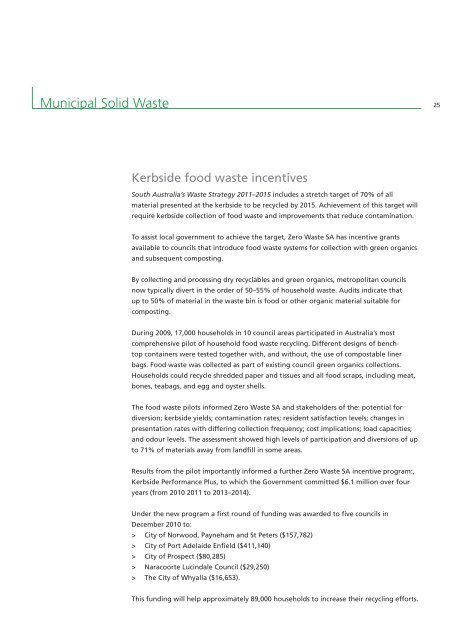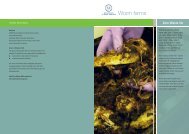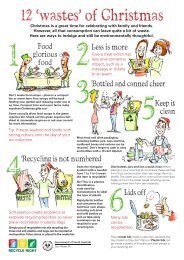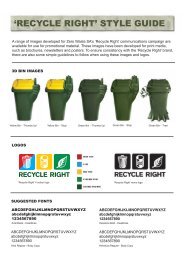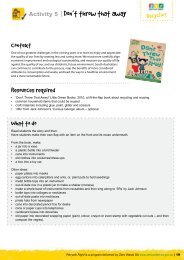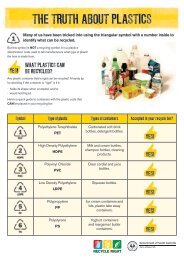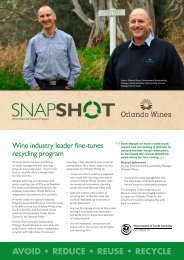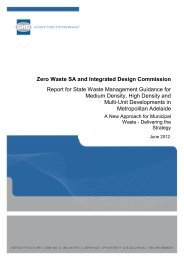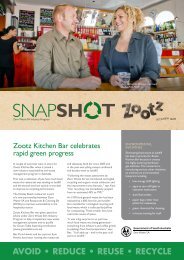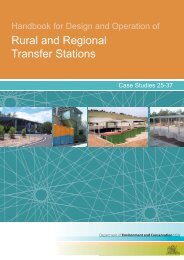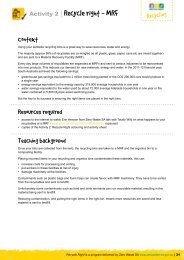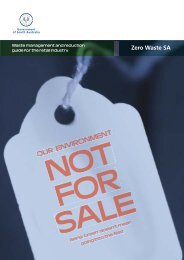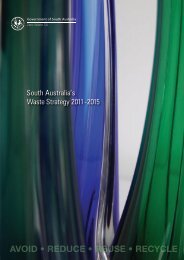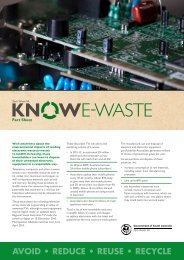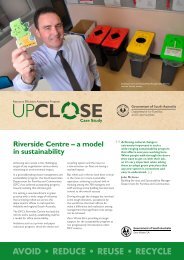Annual Report 2010-11 - Zero Waste SA - SA.Gov.au
Annual Report 2010-11 - Zero Waste SA - SA.Gov.au
Annual Report 2010-11 - Zero Waste SA - SA.Gov.au
Create successful ePaper yourself
Turn your PDF publications into a flip-book with our unique Google optimized e-Paper software.
Municipal Solid <strong>Waste</strong><br />
25<br />
Kerbside food waste incentives<br />
South Australia’s <strong>Waste</strong> Strategy 20<strong>11</strong>–2015 includes a stretch target of 70% of all<br />
material presented at the kerbside to be recycled by 2015. Achievement of this target will<br />
require kerbside collection of food waste and improvements that reduce contamination.<br />
To assist local government to achieve the target, <strong>Zero</strong> <strong>Waste</strong> <strong>SA</strong> has incentive grants<br />
available to councils that introduce food waste systems for collection with green organics<br />
and subsequent composting.<br />
By collecting and processing dry recyclables and green organics, metropolitan councils<br />
now typically divert in the order of 50–55% of household waste. Audits indicate that<br />
up to 50% of material in the waste bin is food or other organic material suitable for<br />
composting.<br />
During 2009, 17,000 households in 10 council areas participated in Australia’s most<br />
comprehensive pilot of household food waste recycling. Different designs of benchtop<br />
containers were tested together with, and without, the use of compostable liner<br />
bags. Food waste was collected as part of existing council green organics collections.<br />
Households could recycle shredded paper and tissues and all food scraps, including meat,<br />
bones, teabags, and egg and oyster shells.<br />
The food waste pilots informed <strong>Zero</strong> <strong>Waste</strong> <strong>SA</strong> and stakeholders of the: potential for<br />
diversion; kerbside yields; contamination rates; resident satisfaction levels; changes in<br />
presentation rates with differing collection frequency; cost implications; load capacities;<br />
and odour levels. The assessment showed high levels of participation and diversions of up<br />
to 71% of materials away from landfill in some areas.<br />
Results from the pilot importantly informed a further <strong>Zero</strong> <strong>Waste</strong> <strong>SA</strong> incentive program:,<br />
Kerbside Performance Plus, to which the <strong>Gov</strong>ernment committed $6.1 million over four<br />
years (from <strong>2010</strong> 20<strong>11</strong> to 2013–2014).<br />
Under the new program a first round of funding was awarded to five councils in<br />
December <strong>2010</strong> to:<br />
> City of Norwood, Payneham and St Peters ($157,782)<br />
> City of Port Adelaide Enfield ($4<strong>11</strong>,140)<br />
> City of Prospect ($80,285)<br />
> Naracoorte Lucindale Council ($29,250)<br />
> The City of Whyalla ($16,653).<br />
This funding will help approximately 89,000 households to increase their recycling efforts.


